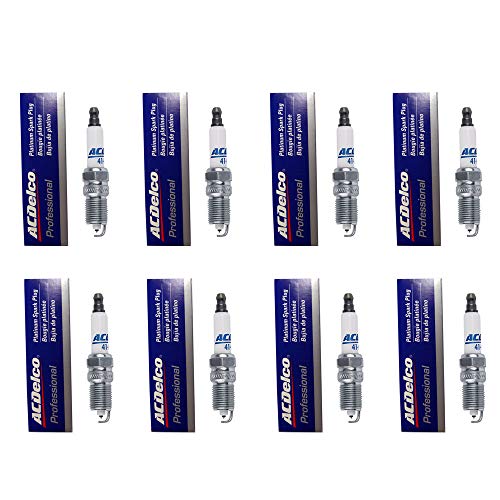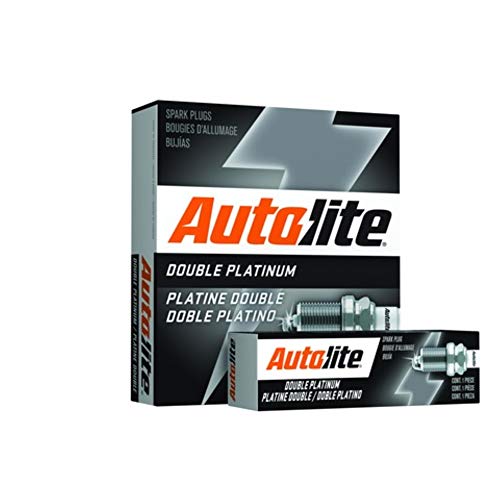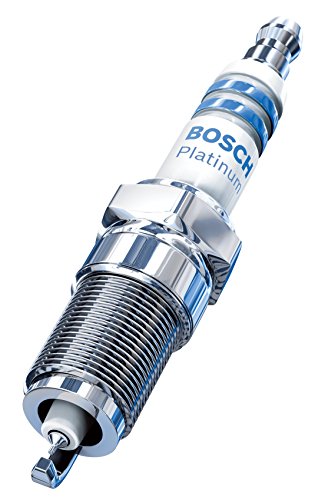*This post may contain affiliate links. As an Amazon Associate we earn from qualifying purchases.
Some of us never think twice about our spark plugs and what they have to do with engine efficiency and power. Others of us think about them only when something goes wrong, but that’s about it.
Still others among us are very interesting in revving up the horsepower of our engines; but the spark plug isn’t naturally the first thing we think about when considering power issues.
It’s time to change all that, because the best spark plugs can do a lot to give you a powerful, smoothly running engine that you’ll love to drive again.
The best spark plugs for horsepower can improve your engine efficiency, give you faster acceleration, beef up your horsepower, and give you a smoother idle. You might also see an increase in fuel efficiency, too.
In fact, many times rough riding, high-mileage cars can be made to run like nearly new with the best spark plugs installed.
We’ve looked at quite a few plugs you might choose from and narrowed the field to the ten best spark plugs that are readily available and useful for improving your car’s performance.
How We Reviewed
There are so many spark plugs out there and so much to be had from getting the perfect plug for your engine that it was a real challenge to narrow down the choices to the very best spark plugs you can get.
Our goal here was not to find the cheapest plugs, but the ones that will really increase your performance and power. We looked at spark plugs suitable for a range of vehicles and engines.
For each of the plugs on our list, we looked at the features they have and then considered what real users have to say about them.
We looked at the number of prongs each plug has, which can determine how well the arc forms and the consistency of your spark, and considered the materials each spark plug is made from.
Finally, we looked into the performance enhancement that each model offers. All the best spark plugs advertise a certain amount of performance enhancement, but we were particularly interested to see what the real-life experience has been for people who use these plugs.
We’ll tell you all about it for each spark plug we review.
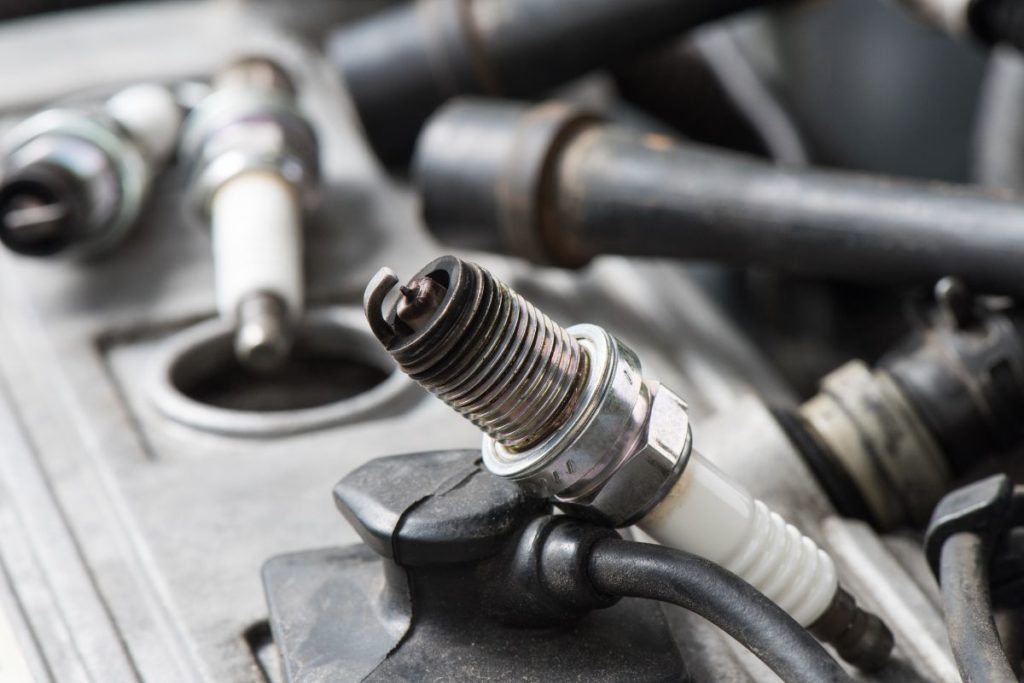
Overall Price Range
The more expensive the plug, the higher quality the material used to make it. The more expensive plugs will also have special features like longer insulator noses, triple gasket seals, or special zinc dips to make it harder for corrosion to take hold. The pricier options also often have shielding against radio interference.
10 Best Spark Plugs
Denso (4504) PK20TT Platinum TT Spark Plug
Summary
The Denso PK20TT (found here) is a platinum spark plug with an 11mm center electrode and titanium-enhanced ground strap. The insulator is made from purified alumina powder. This gives it particularly excellent thermal conductivity and resistance to high-stress conditions.
Denso is one of the oldest names in platinum spark plugs, so they really know what they’re doing. These come pre-gapped as long as you chose your particular engine model before ordering; but some users recommend double-checking with a gap gauge anyway, just in case
Performance Enhancement
Denso claims that this will give you better acceleration and fuel economy. Those who have installed them report that these claims are true and that they experience less hesitation between depressing the accelerator and getting more speed.
Others reported that their RPMs decreased significantly at higher highway speeds, indicating better efficiency.
# of Prongs
This is a double-tipped spark plug.
Main Spark Material
Platinum
NGK (3403) TR55GP G-Power Spark Plug
Summary
These inexpensive spark plugs (found here) are made from a platinum alloy and have a 0.6mm laser-welded tip. They use a special metal plating that helps prevent corrosion and seizing, and the triple gasket seal prevents any gas leakage. These might just be the best spark plugs you’ll find in platinum and at these prices.
These also come pre-gapped as long as you order based on your specific engine. In most cases, users felt the gap was done correctly. However, some users have reported issues with misfiring even if they double check the gaps and adjust them correctly.
Performance Enhancement
NGK claims these will improve fuel economy and power, and users generally report noticing better fuel economy and a lot more power at highway speeds.
# of Prongs
There is a single prong on this spark plug.
Main Spark Material
Platinum alloy
ACDelco 41-962 Professional Platinum Spark Plug
Summary
This double platinum spark plug (found here) is one of the best spark plugs we reviewed, with a price to match. The plug is fired in one piece to create a seal that is completely gas-tight. This makes the plug resistant to pressure much longer than other plugs. The double platinum pad makes it both durable and very consistent when it fires.
ACDelco is one of the biggest names in car parts, and it’s hard to go wrong with these spark plugs. Make sure you get the right size for your engine to ensure a perfect gap. These spark plugs are specifically helpful in enhancing performance on high-mileage cars.
Performance Enhancement
NGK claims these will improve fuel economy and power, and users generally report noticing better fuel economy and a lot more power at highway speeds.
# of Prongs
There is a single prong on this spark plug.
Main Spark Material
Platinum alloy
Autolite APP104 Double Platinum Spark Plug
Summary
These spark plugs from Autolite are a very reasonable price. The tips are designed to resist erosion, and the electrode fires quickly and cleanly. While the electrode is copper and the sides a nickel alloy, the tip is double platinum; so you get no misfires and good durability, especially considering the price.
These spark plugs (found here) are pre-gapped, as many are, but you are always wise to double-check the gap, especially when buying a cheaper spark plug.
Performance Enhancement
We were surprised to find users raving about these plugs. They aren’t expensive and we didn’t feel incredibly impressed when we took them from the box. Yet they have excellent ratings everywhere, with users commenting about smoother idling, better gas mileage, fewer misfires, and lots more power.
# of Prongs
These are a single prong spark plug.
Main Spark Material
Double platinum
Bosch (4504) Platinum IR Fusion Spark Plug
Summary
Whether you’re buying a spark plug or a refrigerator, it doesn’t get much better than Bosch. These have a true fused iridium and platinum center electrode, and they have even designed it with an extended nose. This means the nose reaches self-cleaning temperatures and then cools down quickly, so you don’t have to worry about carbon buildup.They are factory pre-gapped, and you can largely trust this gapping to be correct for your engine. These spark plugs will resist both oxidation and stress wear better than most.
Performance Enhancement
Bosch claims these will give quicker starts and better performance as well as extend the life of your ignition system by putting less stress on it. Users report these claims to be largely true, noting a lot of power improvement and better fuel economy when they switched to these spark plugs. Others noticed faster response times in acceleration and smoother idling.
# of Prongs
The four prong electrode design gives a great spark and helps you make the most of your fuel under all conditions. They are also designed to ensure that you get the same level of performance throughout the lifespan of your spark plugs.
Main Spark Material
Platinum and iridium
NGK (5464) BKR5EIX-11 Iridium IX Spark Plug
Summary
These NGK plugs (found here) are made from iridium. They ignite quickly and reliably and are very resistant to fouling. The tip is 0.6mm laser-welded and offers a consistent spark with a minimal quenching area. With iridium’s extremely high melting point, these are a great choice for high-performance, modern cars.
The spark plug’s design resists fouling, flashover, gas leakage, corrosion, and seizing.
Performance Enhancement
Users rave over these reasonably priced spark plugs. They make an enormous difference to older engines and a noticeable power difference overall. You can expect smoother running and better power, but not as much fuel efficiency performance as with some of the other spark plugs we reviewed.
# of Prongs
These are a single prong spark plug.
Main Spark Material
Iridium
ACDelco 41-993 Professional Iridium Spark Plug
Summary
These NGK plugs (found here) are made from iridium. They ignite quickly and reliably and are very resistant to fouling. The tip is 0.6mm laser-welded and offers a consistent spark with a minimal quenching area.
With iridium’s extremely high melting point, these are a great choice for high-performance, modern cars. The spark plug’s design resists fouling, flashover, gas leakage, corrosion, and seizing.
Performance Enhancement
If you have a GM vehicle, you can expect these to fit perfectly, enhance speed and pickup, and give you a smooth-running vehicle again. The only thing to note is that they seem to become a bit sluggish after 50,000 miles even though they are rated for 100,000.
# of Prongs
These are a single prong spark plug.
Main Spark Material
Iridium
E3 Spark Plug E3.36 Powersports Spark Plug
Summary
These performance spark plugs (found here) are designed to get you racing at top speeds, and they are indeed used by many professional racers. They are colder than most standard factory plugs and are made from an iridium alloy specially designed to keep things cool. They have excellent durability.
They are also designed to improve fuel efficiency in a way that reduces vapors, leading to fewer emissions.They’ve done some serious factory testing on these and found they increase horsepower by an average of 12% in a four-cycle engine while reducing emissions by close to 50%.
Depending on the class of engine, their tests saw anywhere from 4% to 13% greater fuel efficiency.
Performance Enhancement
Some users were put off by the fact that you can’t gap these, but the preset gaps seem to work for nearly everyone. Most users saw power increases and increased responsiveness, especially for motorcycles. However, the gas mileage doesn’t seem to get dramatically better under real-world conditions.
# of Prongs
These have three prongs in a special design made to produce a good spark and a perfect flame kernel.
Main Spark Material
Iridium
Bosch 6702 Platinum Spark Plug
Summary
These plugs (found here) come with a four-year guarantee and carry the fine Bosch tradition of quality at a very good price. The firing pin is made of platinum and iridium, and the entire spark plug is laser welded to give it good durability.
You don’t need to add any anti-seize with these spark plugs, and the core wire is fine enough that they don’t need the voltage that others do to run. They are advertised as suitable for 50,000 miles, but users regularly report taking them to as many as 75,000 miles without an issue.
Performance Enhancement
Users love these spark plugs. They stop misfiring, increase engine power, and improve fuel economy in nearly any vehicle. They are generally correctly gapped and easy to adjust if you need to.
# of Prongs
These spark plugs have a single prong.
Main Spark Material
Platinum and iridium
NGK (4548) CR9EK Standard Spark Plug
Summary
This is a standard spark plug made of copper and nickel, with a long nose that helps resist fouling. Like the other NGK offerings we considered, it has features that prevent flashover and a triple gasket seal.
These plugs (found here) are especially beloved of motorcyclists, and they will work as well, if not better, than the standard plugs that come from the factory. Unfortunately, since they have two prongs they can’t really be gapped by the end user.
Performance Enhancement
These work well, but users do not consistently report any genuinely significant changes in power or performance. However, if you have an older engine that must use a copper and nickel spark plug, these will be one of your best choices.
# of Prongs
These have two prongs for a consistent spark.
Main Spark Material
Nickel alloy with zinc-dipped shell
Spark Plug FAQ
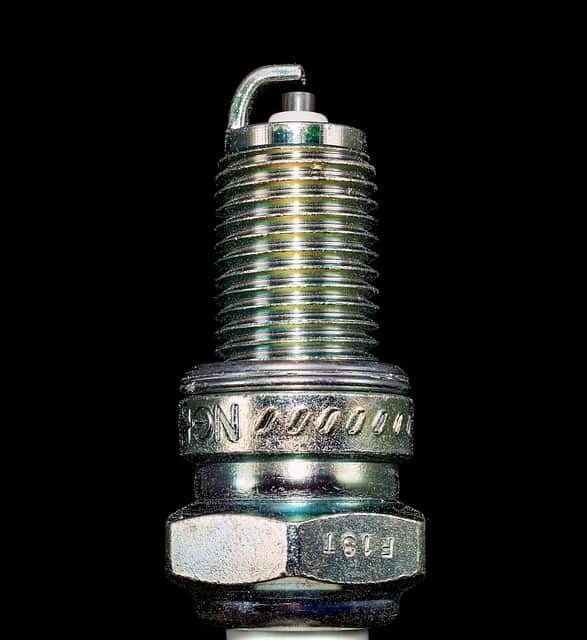
If this is the first time you’ve really thought about how your spark plugs might affect your engine power, it’s time to get up to speed on what they are, how they work, what makes for the best spark plugs, and how to use them to enhance the performance of your engine.
What Is a Spark Plug?
Understand Your Engine
An engine is a machine that turns energy into movement through a series of controlled explosions. The fuel we put in our cars has tremendous potential energy. The key is turning it from potential energy to kinetic energy that powers movement in a way we can control.
We could, of course, turn it into kinetic energy in a completely uncontrolled manner very easily with a match; but that’s not going to do anyone any good.
The engine makes use of your fuel by filling valves with a mixture of gas and air and forcing it into a small space. In that confined space, the two become very explosive, and the compression increases the potential energy release even more.
All that compressed fuel and air ignites, and once that mixture explodes, the shape of the valve forces the energy of that explosion in a specific, controlled direction. The energy is then used to jam a piston down with great force.
That piston is connected to your engine’s crankshaft, which then turns and your car starts moving forward. Or backward, if that’s what you want.
How Spark Plugs Work in the Engine
To get that fuel and water mixture to ignite, you need a small spark, and that’s where the spark plugs come in. Spark plugs create electricity that jumps in an arc across two metal leads, and this arc is what ignites your fuel mixture.
A pretty sophisticated system of electrical equipment controls the timing of all this so that you get the right amount of power when you want it or ask for it by pressing down on your accelerator.
Another nifty feature of these little devices is their ability to transfer heat away from the chamber where all this combustion is happening. That helps keep your engine from overheating.
When you read in your engine specs about having a “four-cylinder” or “six-cylinder” engine, that also tells you how many spark plugs you’ve got. There is generally one for each cylinder. If you have a HEMI engine, however, you’ll have two spark plugs for each cylinder.
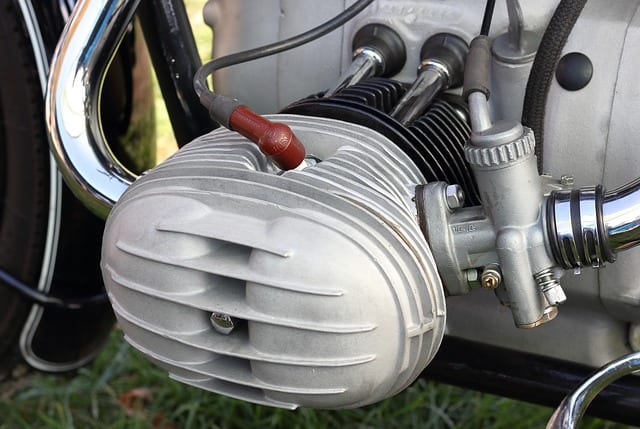
What Do You Make a Spark Plug From?
Your average traditional spark plug has a copper electrode core encased in porcelain, and it is this porcelain that transfers the heat. The core is surrounded by a nickel alloy. On top is a terminal where the plug wires attach, and this terminal is connected to the copper core.
Your spark plug will also have a hex-shaped head so you can use a socket wrench to tighten or loosen the spark plug within the engine. Below that, you’ll see a gasket, and the rest of the outer bit of the spark plug will be threaded; a bit like a giant screw.
At the very bottom is a little bit of the core electrode sticking out. The spark plug is capped with a ground strap that arches around and almost touches the bit of core electrode. The ground plug could be made of steel, titanium, and anything in between, but most commonly it is made from nickel alloy, platinum, or iridium.
It can be just one notch, shaped like a Y, or have two, three, or four notches. The arc of electricity runs from that little bit of the core that sticks out to that ground strap.
What Are the Basic Types of Spark Plugs?
All spark plugs are divided into two basic types: hot and cold. A hot plug has more insulation around the core than a cold one, and this is the most common type of plug and the one you’ll find in your standard engine right off the assembly line.
The purpose of that extra insulation is to make sure the temperature of the spark plug stays hot enough to keep carbon deposits from building up on it. All other things being equal, this means your plug lasts longer.
Cold plugs are the best spark plugs for high-compression engines with enormous horsepower.
As you might guess, they have less insulation around the core, and what this does for you is make them much more efficient at whisking heat away from the combustion chamber and into the cooling system. When you have a big, powerful engine, a cold spark plug is often going to give you a lot more efficiency.
What Makes for the Best Spark Plugs?
The best spark plug for you is going to be the one that works well in your engine, but there are some things to know about high-end spark plugs. For one thing, the best spark plugs are made from premium metals with high melting points.
This means they last longer and transfer heat more efficiently than cheaper spark plugs. However, that’s not all there is to the story. In some cases, a simple copper and nickel spark plug will serve you better than something made of platinum or iridium.
The best spark plugs also need to be durable. They should be able to resist the high heat, corrosion, and pressure they’ll experience throughout the course of their working life. They should also deliver a consistent spark to ensure that you always get a smooth burn.
Finally, they should either have just the right gap for your engine’s specs or they should be adjustable so you can get them to the right gap yourself.
What Are the Special Types of Spark Plugs?
Standard
This is your basic copper and nickel plug, and these generally costs the least to replace. They also last the shortest amount of time, and especially in modern, high-energy cars. That doesn’t mean they are always an inferior choice, however. There are two specific times and places where you really want to use this type of spark plug.
First, if you have a turbo-charged engine or one with a high compression ratio, your engine might be specifically designed to use these spark plugs. That’s because copper will give you the most reliable spark in tough conditions. Check with the manufacturer, because they will usually specify if you should stick with copper plugs.
Second, if you have an engine built before 1975, you will want to use these copper and nickel spark plugs. These are the best spark plugs for all ignition systems built before high-energy systems became common in car engines in the 70s.
Single Platinum
These spark plugs have a platinum electrode center, and they will last twice as long as standard plugs under normal conditions. They are much harder than copper and nickel, and they do not erode like copper and nickel plugs.
They also resist carbon buildup much better than standard plugs. The single platinum plug is fast becoming the new standard for new cars and trucks.
However, some people feel that they give a less consistent spark than copper since platinum is an inferior conductor. This is quite true, and that’s one reason why they won’t be a good choice for an older engine.
Modern engines have better airflow systems that compensate for this, so it’s not an issue. Older vehicles can’t deal with the platinum spark plug and will generally have issues if you try to install one in them.
Double Platinum
These are called double platinum because the ground strap is platinum as well as the center electrode, and this is a much more expensive spark plug. It does usually perform a bit better, and it definitely lasts a lot longer than single platinum plugs, however. Often these plugs will have multiple prongs on the tip to make it more likely you’ll get a consistent spark.
Silver
These spark plugs have a silver tip. This means they conduct heat extremely efficiently, working hard to keep your car’s engine cool. They are often the best spark plugs for older performance cars out of Europe and for a lot of motorcycles. They don’t have the longevity of the platinum plugs, however, and they aren’t a choice you’ll see every day among the best spark plugs.
Iridium
These are pricey plugs that can last almost as long as platinum but offer more powerful combustion that helps engines run very smoothly. Using them is a personal choice, but they typically work in any mid-1980s age engine or newer. At times you may even find plugs with a platinum and iridium mix.
Will Any Spark Plug Fit in My Engine?
Sadly, no. It’s important to get the right plug, and your choice will depend on your engine, its age, and the type of plug you want to get. The main issue to understand is gapping.
The gap on your plug is the distance between the ground strap and that tiny bit of the core that sticks out. If the gap is too small, then your spark might not completely ignite your fuel mixture. When that happens, you get misfires and inefficient burning.
If the gap is too large, you won’t have misfires, but you also won’t be getting the power from your engine that you would expect and your fuel economy will tank. Many modern spark plugs are pre-gapped to fit specific engines, so, fortunately, it’s not difficult to find what you need for a simple spark plug change.
However, if you have an older or custom engine, you will want to gap it correctly using the correct gapping tool. Your car’s owner’s manual (or a quick online search) will tell you exactly what gap you need.
How Do I Choose the Right Spark Plug for My Engine?
Your best bet is always to check your owner’s manual. There is usually a specification sheet right near the front or in the pamphlet that comes with your car, and that will tell you specifically what size electrode gap you need, the designation number, and recommended brands of spark plugs.
If you can’t find this info in the owner’s manual, it’s probably printed on a metal plate inside the hood or in front of the radiator. It might even be on a tag visible only when your driver’s side door is open or in the glove compartment.
Older Engines
Let’s say you’re building or rebuilding your own engine, got a salvage car or a very old one, or for whatever other reason don’t have an owner’s manual and can’t find any printed info. To find out what spark plugs you need, you’ll need the following information:
- The number of cylinders in your engine
- The displacement of your engine (how much room there is in the cylinders when the piston is at its lowest point)
- Whether the engine is automatic or standard
- What kind of fuel system you have (throttle body inject, multi-point inject, or the number of carburetor barrels)
- The make of your vehicle
With that information in hand, you should be able to get the right part with the help of salesperson at an auto supply store. However, if you are having trouble finding your spark plug information, you might also have trouble finding out all the information about your engine.
In that case, here’s what you should do:
- Ask the manufacturer. Give them a call if you don’t have a manual. As long as you have the model and year, they should be able to tell you.
- Ask your mechanic. A good mechanic should be able to take a look directly and then help you find the best spark plugs for your car.
- Don’t buy used from your friend’s cousin. There are some car parts you can buy used and still get a great deal. Spark plugs aren’t one of these parts. You have no idea what used plugs have been through; and no idea how they’ll perform.
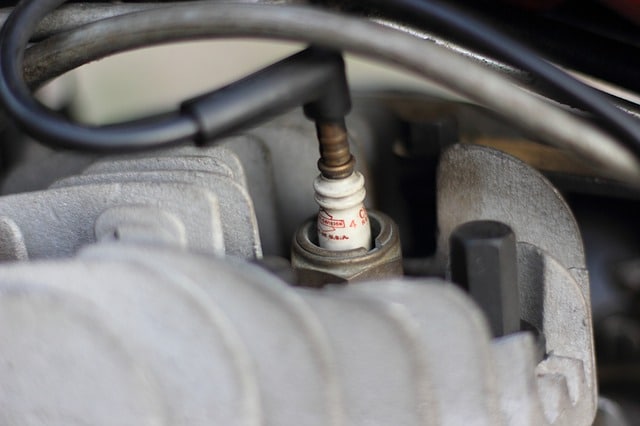
How Do I Know It’s Time to Change Spark Plugs?
If you’re not changing out your plugs for better performance, you just need to know when to change them in the ordinary course of your car’s life. The surest way to tell if you need new plugs is to just look at your mileage.
At 30,000 to 50,000 miles, most cars will need new plugs. If you have high-performance iridium or platinum plugs, they can often go 100,000 miles before they need a change; but it’s important to find out for sure before you assume this.
In most newer cars, the check engine light will flash on and off if a spark plug is starting to fail. You may also experience difficulty getting the engine to start in the first place. If you can get it started, but it feels and sounds rough when you’re idling, the spark plugs might be to blame.
Another way to tell if you need to change your spark plugs is to monitor your fuel economy. If you notice you’re not getting the mileage per gallon that you used to, dirty spark plugs could be the issue. You should also consider changing the plugs if you find your car won’t accelerate as it should or your power level just doesn’t seem right.
Can the Best Spark Plugs Improve My Engine’s Power?
Yes and no; or, more accurately, they do more to prevent a loss of horsepower than they do to actually increase it. The most important factors in your engine’s power are always going to be the overall design and your ignition timing. But good spark plugs can help, and here’s why:
Your Fuel Mixture
When fuel and air are pulled up into each cylinder, the precise ratio of fuel to air to random contaminants like dust will vary every time. It’s impossible to ensure it’s always the same, and that means the power will also vary, if only slightly, from stroke to stroke as your engine runs.
Sometimes a spark will set off the mixture in the cylinder really well; other times less well, and the mixture will burn at slightly different rates.
The gap between your ground strap and the bit of the core electrode also creates what is known as a “quenching area” within the cylinder. A quenching area is a spot where the probability of achieving ignition is low, so the smaller the quenching area is, the better your chances of getting a good ignition and a clean burn.
The best spark plugs have very small electrode diameters, and the smaller diameters make for a smaller quenching area. A typical standard spark plug electrode is about 2mm, while the thinnest performance iridium plug electrodes are only 0.4mm.
With a smaller quenching area, you have a better chance of stable combustion and less variation in strokes, meaning your engine makes better use of fuel and achieves its full power potential.
Old Spark Plugs
Having old, carbon-encrusted spark plugs will greatly diminish your engine’s efficiency and power. Simply keeping on top of your spark plug changes, whatever plugs you use, will do a lot to keep you running at peak power. The best spark plugs resist corrosion much longer than standard ones, which is another way they can help keep your power level high.
How Do You Change a Spark Plug?
To change your spark plugs, you will need a gap gauge to measure the gap between the electrode and the ground strap, a gapping tool to make adjustments if needed, and a spark plug socket. Most wrench sets come with a spark plug socket, so if you have a decent set you’re probably already good to go.
Finding the Plugs
When you open the engine, you’ll see a bundle of wires, and these lead to your spark plugs. The wires are important, as they are programmed to fire your spark plugs in a particular order for maximum efficiency. If you have a four-cylinder engine, the plugs will probably be on top.
If you have a six-cylinder engine, they’ll likely be on the top or the side. For V-8 engines, look for half to be on one side and half on the other. Make sure your engine is completely cool before you do anything else, and always make sure your engine ignition is off and the key is out before you start changing your plugs.
Choosing and Removing a Wire
Always remove just one plug at a time and fit the wires back on before moving on to the next spark plug. This way you won’t accidentally get your wires crossed. Gently remove the wire, pulling it back and force carefully till it comes out. Don’t ever wrench it out harshly. Now you’ll be able to reach the spark plug with your socket wrench.
Unscrewing the Plug
Use the socket to unscrew your spark plug, moving counterclockwise, and lift it out. If you can’t get the spark plug to move, don’t force it. You could break it off, and then you’ll be in a world of hurt. Try putting some WD-40 on it and waiting an hour. If that doesn’t work, get professional help.
Checking and Inserting Your New Plug
Before you put in your new spark plug, check the gap on your new spark plug with the gap gauge and adjust it if necessary. Your owner’s manual will tell you exactly what the gap should be. Add some anti-seize lubricant to the tip, which will keep the different metals in the engine from reacting badly with one another.
Place your new plug into the hole and tighten it just a little. Make sure it is properly aligned by twisting it back and forth a few times until you can feel it moving smoothly. Once you’re sure it is in correctly, use the socket to fully tighten it.
Connect the loose wire to the plug’s terminal, pushing firmly but gently till you feel it snap in place. Once you start the engine up, if you feel or hear it misfiring, the most likely culprit is one of the wires. Pull them off and put them back on again carefully to make sure they have connected correctly.
How Do You “Read” a Spark Plug?
Remove a spark plug and take a look at it. If the spark plug has been in there for a while and looks all shiny, it is probably overheating and you need a hot plug. If the plug is white, it is much too hot for your engine and you need a colder plug.
If you see oil on your plug, then you’re getting oil into the combustion chamber and need to check for cracks or leaks. Your spark plugs have nothing to do with this issue, but their condition can tell you if there’s a problem.
If your spark plug has turned black, then it has built up too much carbon. If the spark plug is old, this may be fine; but most times it indicates there’s too much fuel in your mixture of fuel and air. This is usually a computer issue. If only one of the plugs is black, however, this probably means you have a leaking fuel injector in just one of the cylinders.
What’s the Deal With “Radio Interference?”
If you look for spark plugs, you’ll notice that quite a few advertise materials or seals that “reduce radio frequency.” The way some spark plugs are designed, they can emit a radio frequency when they fire.
If this interferes with the signal reaching your car stereo, it will be annoying and possibly frustrating. If you have a boat, it could be life-threatening if you can’t communicate in an emergency. The best spark plugs have special shielding or design to minimize or eliminate this issue.
How Else Can I Boost Power?
In addition to getting better spark plugs, there are a few other things you can do to inexpensively increase horsepower and torque in your vehicle:
Get a Cold Air Intake
The denser the air that mixes with your fuel, the more power you’ll get with each combustion. Colder air is denser than warm air, so a cold air intake will get you around five more horsepower. This is a very cheap and fast way to boost performance in conjunction with installing the best spark plugs.
Get Better Oil
Believe it or not, your oil will have a big effect on your horsepower. The newest performance synthetic oils significantly reduce friction and heat in your engine, which means your engine will perform at its peak. If you combine that with performance spark plugs that efficiently wick heat away from the cylinder, you will see a big difference in power for a small investment.
Get a Better Muffler
A better muffler will improve the flow of exhaust away from your car, improving your horsepower by making everything just that much easier for the engine.
The Verdict
Some people don’t really care about getting the best spark plugs: they just want something that works. If that’s you, you can choose any of the plugs on this list and be confident you’re getting a product that will work well. But if you are trying to tweak that last ounce of performance out of your engine, your choice of spark plug could make all the difference.
Best Overall
If we could only recommend one spark plug, for our money it would be the Bosch Platinum IR Fusion Spark Plug. You would be hard-pressed to find anything better. The construction quality is perfect, and it does exactly what it claims.
Best for Older Cars
If your engine is pre-1970s and you need something that will give you good, reliable performance, we recommend the NGK CR9EK Standard Spark Plug. For newer vehicles you’ll be able to find something much better, but for you classic car purists out there, these are the best spark plugs for you.
Best for a Budget
If you want to spend as little as possible but still see a strong performance increase in your engine, then the Autolite APP104 Double Platinum Spark Plug is the plug you want. The quality of these, considering the price, is unbeatable.
Best for a Workhorse
If you’ve got a car on its last legs, with hundreds of thousands of miles on it and a wheezing engine, your best bet at reviving it and squeezing out another 100,000 miles is the ACDelco 41-962 Professional Platinum Spark Plug. These are particularly effective for high-mileage engines.
Best for Performance Cars
If you have a modern performance car, the NGK (5464) BKR5EIX-11 Iridium IX Spark Plug will help you achieve faster starts and higher speeds. You won’t see a huge change in fuel efficiency, but that’s not really why you have a performance car in the first place, right?
Whatever you choose, be safe, be smart, and have a great drive.



